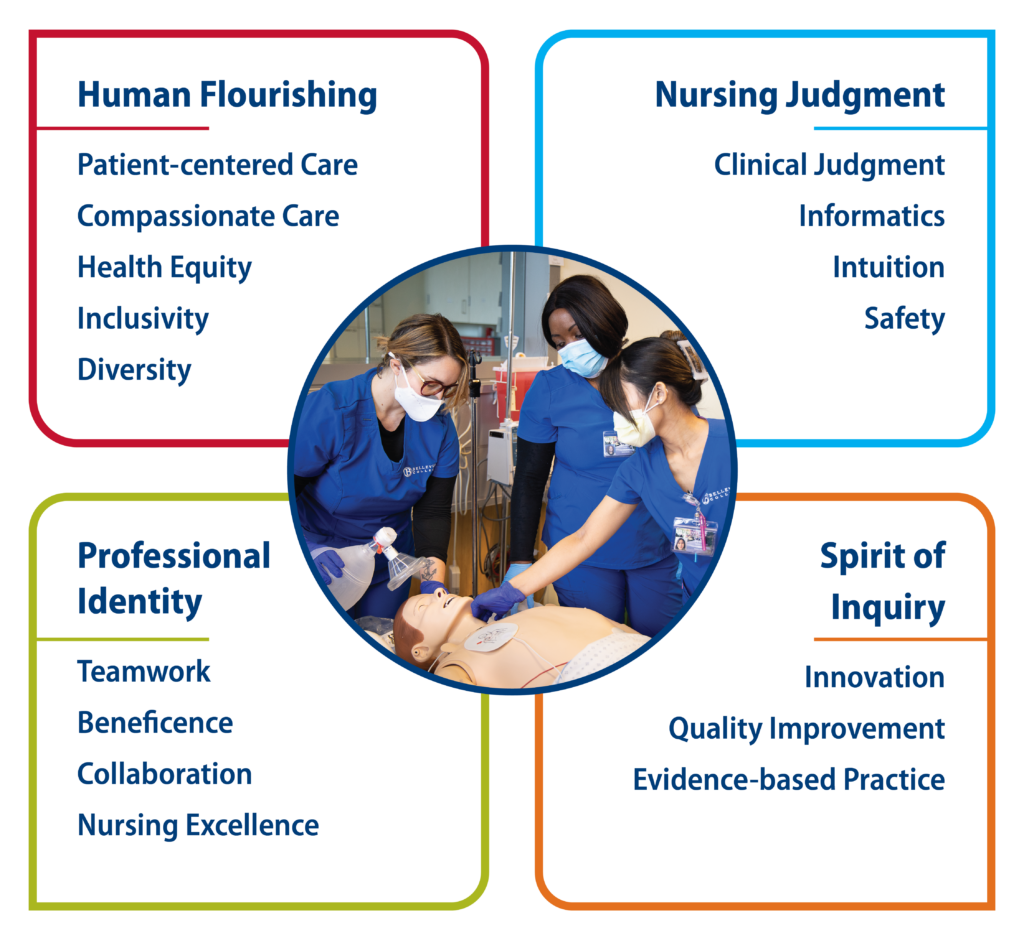VISION
The Bellevue College ADN Program stands as the region’s associate degree in nursing (ADN) program of choice, distinguished by its commitment to excellence and innovation in nursing education. The ADN faculty and staff are dedicated to enhancing the health, well-being, and overall quality of life for our students, patients, and the community.
MISSION
The Bellevue College ADN program is a student-centered program, committed to educating a diverse nursing workforce to meet the unique healthcare needs of our local and global community. The program develops graduates who are prepared to pass the NCLEX examination, to practice as registered nurses, and continue lifelong learning and education. The ADN program cultivates nursing graduates who become valuable and active contributors to our local, regional, and global health community.
CORE VALUES
Bellevue College Nursing upholds its mission of excellence in nursing education and practice, guided by core values that are woven throughout the program:
- Health Equity
- Inclusivity & Diversity
- Nursing Excellence
- Clinical Judgement
- Beneficence
- Compassionate Care
- Evidence-based Practice
- Innovation
- Safety
NURSING PHILOSOPHY
In alignment with the mission and goals of Bellevue College and guided by the nursing faculty’s vision, mission, and core values, our nursing philosophy emphasizes innovation and excellence in nursing education. It fosters the evolution of a student nurse into a registered professional nurse, equipping them to enter, excel, and continuously advance within the nursing discipline. Graduates are prepared to pass the NCLEX examination and are primed for a lifelong journey of learning and adaptability. The cornerstone of our philosophy is the preparation of nursing graduates who actively contribute to the well-being of our local, regional, and global communities.
The NCSBN clinical judgement model guides the curriculum. Students are prepared to recognize and analyze cues, prioritize concerns, generate solutions, act, and evaluate outcomes. Students apply ethical considerations to navigate complexities in healthcare decision-making.
The ADN curriculum encourages students to develop deep understanding and appreciation of the human experience within healthcare. Swanson’s Theory of Caring, with its five caring processes—knowing, being with, doing for, enabling, and maintaining belief—serve as guiding processes throughout each aspect of the program.
Our graduates are equipped with the skills and knowledge necessary to provide care in a safe environment. Our curriculum reflects a commitment to the Quality Safety Education in Nursing (QSEN) competencies, which include patient-centered care, teamwork and collaboration, evidence-based practice, quality improvement, safety, and informatics.
The ADN program aligns with the National League of Nursing’s (NLN) ADN Competencies, which provides expectations for nursing graduates. These competencies encompass Human Flourishing, Nursing Judgment, Professional Identity, and a Spirit of Inquiry. In our program, we nurture an understanding of Human Flourishing that extends beyond physical well-being to embrace the holistic health of individuals and communities. Graduates are equipped with the skills and knowledge to provide patient-centered care that promotes physical health, as well as emotional and psychological well-being. Nursing Judgment is a core element of our curriculum, where students learn to apply critical thinking, clinical reasoning, and ethical decision-making to complex healthcare situations. Our emphasis on Professional Identity ensures that our graduates uphold the highest standards of professionalism, ethics, and accountability in their nursing practice and that they form a deep and enduring commitment to the profession. Lastly, we foster a Spirit of Inquiry, encouraging graduates to seek out evidence-based practices, engage in continuous learning, and contribute to the ongoing advancement of nursing knowledge. Through a comprehensive and robust curriculum, our nursing program prepares graduates to excel in these competencies, making them valuable contributors to the healthcare landscape.
Our philosophy champions global awareness, inclusivity, and international nursing connections, culminating in the establishment of an all-embracing community. Success for our students is facilitated by recognizing the diverse learning styles of all students, including non-traditional or disadvantaged students. We provide a collaborative environment wherein students actively participate in the learning process. Practical, hands-on learning is facilitated through simulation and clinical experiences, while technology and informatics are harnessed to deliver an education that is innovative, accessible, and responsive to the dynamic demands of modern healthcare.
The Bellevue College ADN Nursing Philosophy is based upon the concepts of:
- Kristin Swanson’s Theory of Caring
- National League of Nursing (NLN) Core Competencies
- American Nurses Association (ANA) Code of Ethics
- Quality Safety Education for Nurses (QSEN)
- Academic Progression in Nursing (APIN) in Washington State
- Professional Identity Role Formation (ISPIN)
- Commission for Nursing Education Accreditation (CNEA) Standards
- Bellevue College Vision, Core Values, and Mission
CURRICULUM DESIGN MODEL
ADN education is designed around program learning outcomes and course outcomes in the following areas:
- Caring theory
- Professional and ethical standards
- Teamwork
- Quality improvement
- Evidence-based practice
- Informatics
- Health Equity
- Clinical judgement
- Safety
Teaching methodologies are based on cognitive (thinking), affective (feeling), and psychomotor (doing) domains of learning. Adult learning theories inform a collaborative environment where the student is an active participant in the learning process. Simulation provides experimental hands-on learning. Technology and informatics facilitate innovative, accessible learning. The curriculum design model is based on a cycle of evaluation and revision that responds to changing healthcare demands.

Last Updated November 13, 2023